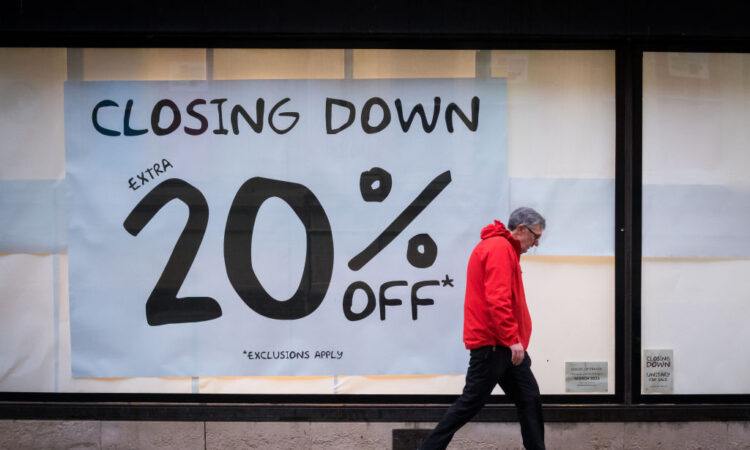
The UK is officially in recession. A recession is defined as two successive quarters of negative growth, and the UK has now reported negative growth in both the third and fourth quarters of 2023.
GDP fell by 0.3 percent from October to December 2023, after falling 0.1 percent in the previous quarter. No sector of the economy was immune from the contraction, with falling output registered across manufacturing, construction, and services.
The Office for National Statistics is now estimating that the UK economy grew by just 0.1 percent throughout 2023, meaning there was effectively no growth last year — the worst performance since 2009, following the financial crisis of 2008.
Economic growth is, of course, shaped by a range of factors, many of which are outside of politicians’ control. The global economy is in a particularly poor state given slowing growth in China and other emerging economies, combined with a severe debt crisis that is afflicting much of the poor world.
But the UK stands out as one of the worst economic performers in the rich world. The only economy currently suffering as much as ours is Germany’s, which contracted by 0.3 percent in 2023 and is estimated to have grown by a meager 0.3 percent in 2024.
The British and German economies are different in many respects, so one has to be careful in making sweeping comparisons. But one striking factor the two countries share is a rigid commitment to fiscal austerity and a long-term refusal among policymakers to countenance any increase in public investment.
Germany has spent the decade since the financial crisis boasting of its commitment to “schwarze null” — or “black zero.” Ever since the financial crisis, the country’s elites have embedded a commitment to balancing the country’s budget across all political and economic institutions. In 2009, this commitment became a legal requirement, enshrined in the constitution as the so-called “debt brake.”
Germany’s political class has made its approach to fiscal policy into a moral crusade, contrasting the country’s responsibility and frugality with the alleged profligacy of the southern European states. The result has been a zealous commitment to austerity that even the Financial Times (FT) has described as “bizarre.”
And as the FT goes on to note, schwarze null has also severely hampered economic growth, leaving German infrastructure in a perilous state and in “dire need” of greater funding.
A change of government has done little to alleviate the problem. Rather than undertaking much-needed investment in infrastructure and decarbonization, the country’s policymakers have spent the last few years mired in legal battles over whether the emergency spending undertaken during the COVID-19 pandemic was unconstitutional.
While Germany’s investment phobia stands out as particularly extreme, the UK is not far behind. According to the Institute for Public Policy Research (IPPR), public investment in the UK has never been above average for OECD or G7 countries. Had the UK invested at the OECD average over the last twenty-five years, it would have yielded an extra £208 billion worth of investment.
And what little investment the UK does undertake is extremely unequally distributed, exacerbating a regional inequality problem that has made the country one of the most regionally unequal in Europe.
Research from IPPR North has showed that the north of England is systematically starved of investment. In fact, if the north were a country, it would have the second-lowest levels of investment of all OECD countries bar Greece.
But a lack of investment isn’t just slowing growth and generating regional inequality — it’s also compromising our ability to fight climate breakdown.
If the UK economy is to transition to net zero, huge amounts of investment will be required in improving public transport infrastructure, expanding renewable energy generation, and improving home insulation. Interventions like retrofitting houses to increase fuel efficiency would create jobs, boost growth, and help to reduce emissions — as well as helping households to save money.
What’s more, longer-term investments such as increasing funding for the research and development of green technologies could significantly improve productivity. And research from Positive Money has shown that reducing our dependence on fossil fuels would help to curtail inflation.
Sir Keir Starmer recently dropped his pledge to invest £28 billion per year in decarbonization, signaling that Labour has effectively given up the fight against climate breakdown. Starmer and Rachel Reeves’ dogmatic commitment to “balancing the books” seems just as zealous as the schwarze null ideology of the German political class.
In Germany, the political consequences of permanent austerity have been disastrous. With no meaningful difference between the country’s main political parties on macroeconomic policy, voters are being pushed to the fringes.
The far-right Alternative for Germany (AfD) recently became the second-most popular party in the country. It is impossible to understand the rise of the far right without reference to the widespread anger at a political system rightly seen as corrupt and unaccountable by the vast majority of people.
When Keir Starmer is elected prime minister and utterly fails to deal with any of the challenges the country is facing, popular anger at our political class is likely to rise. While parties such as the Greens will benefit to some extent, far-right parties and fringe groups could also sweep up millions of voters seeking to deliver a kicking to the entire political establishment.
While such a threat is unlikely to make Keir Starmer lose much sleep, he can’t say he wasn’t warned.






